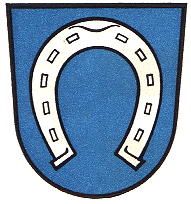Brühl (Baden): Difference between revisions
Jump to navigation
Jump to search
Knorrepoes (talk | contribs) m (Text replacement - "'''↵| ↵|-↵|'''English''' ↵| {{blazon wanted}}↵|}" to "''' | blazon wanted |- |'''English''' | blazon wanted |}") |
Knorrepoes (talk | contribs) m (Text replacement - "{{media}}" to " {{de1}} {{media}}") |
||
| Line 23: | Line 23: | ||
[[Civic Heraldry Literature - Germany|'''Literature''']]: Stadler, 1964-1971, 8 volumes. | [[Civic Heraldry Literature - Germany|'''Literature''']]: Stadler, 1964-1971, 8 volumes. | ||
{{de1}} | |||
{{media}} | {{media}} | ||
Revision as of 09:06, 26 December 2022
This page is part of the German heraldry portal Deutsche Wappensammlung |
Heraldry of the World |
|
German heraldry:
|
Selected collector's items from Germany:
|
BRÜHL
State : Baden-Württemberg
District (Kreis) : Rhein-Neckar Kreis (until 1973 Mannheim)
| German | blazon wanted |
| English | blazon wanted |
Origin/meaning
The horseshoe is quite a common symbol for villages and towns in medieval Baden. Brühl also used a horseshoe as a symbol since at least 1496. It never used arms and on the seals the horseshoe was used as the sole image (not in a shield). In 1900 the horseshoe was first used in arms. As colours the colours of the Wittelsbach family were chosen, as the village belonged for a long time to the Pfalz, a possession of the Wittelsbach family.
Literature: Stadler, 1964-1971, 8 volumes.
Contact and Support
Partners:
Your logo here ?
Contact us
© since 1995, Heraldry of the World, Ralf Hartemink 
Index of the site












